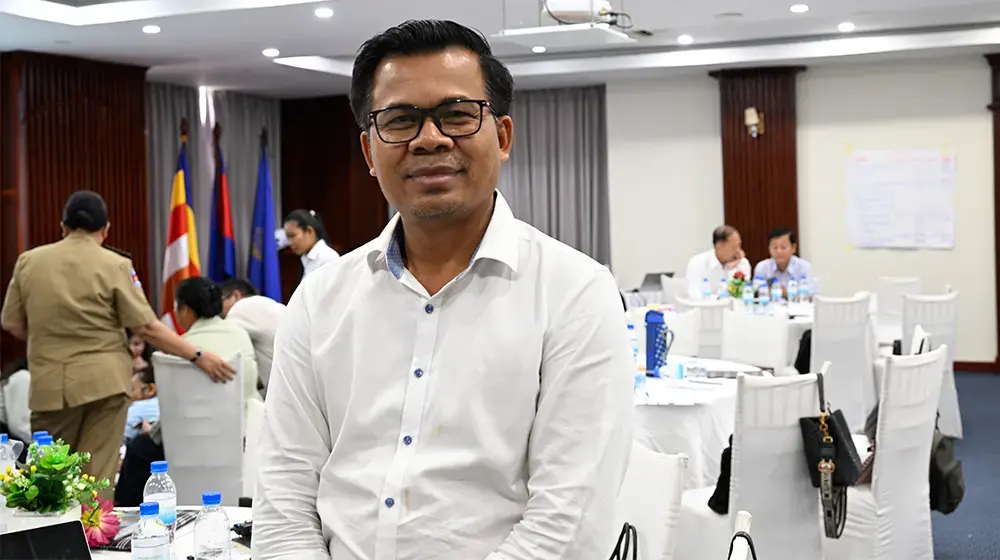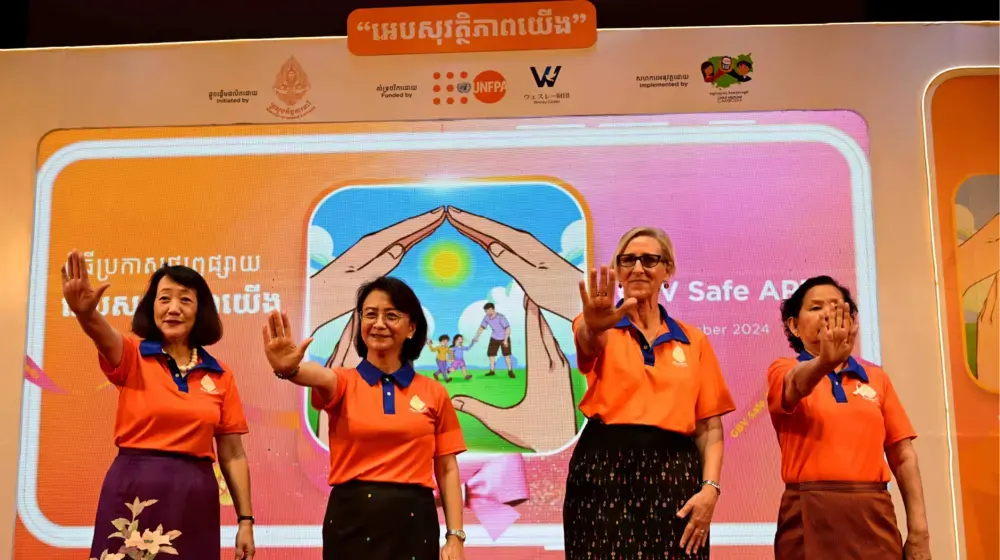One out of three women has experienced some form of violence from their intimate partners. Among them, only a quarter sought help from formal service providers while the majority never talked with anyone about it.
“Indeed health care providers are in a unique position to help prevent some major and life threatening or life changing consequences of violence”, emphasized Ms Catherine Breen Kamkong, UNFPA Deputy Representative during the launch of the Clinical Handbook with 200 health workers across the country in May.
Photo: Her Excellency Oum Samol, Under-secretary of State handing over the clinical handbook to Professor Tung Rathavy, Director of the National and Maternal and Child Health Center during the launching event in May 2017 in Phnom Penh.
According to the 2015 National Survey on Women’s Health and Life Experiences in Cambodia (https://goo.gl/BUwbHP) shows that 50% of women who had experienced physical or sexual violence by an intimate partner were injured, so helping them to get health care is critically important.
“Health personnel are the public figures who give immediate services to a survivor of violence,” highlighted Her Excellency Oum Samol, Under-Secretary of State of the Ministry of Health at the launch of the clinical handbook. “It is essential they are equipped with knowledge and skills to make sure that all women subjected to violence will receive treatment to prevent HIV, STIs and unintended pregnancies as well as counseling.”
Photo: Her Excellency Oum Samol delivering her opening remarks before 200 participants at the launching event.
Sadly, the acceptance of violence in Cambodia is common, especially among poorer women (https://goo.gl/S7ierV). The Cambodian demographic and health survey conducted in 2014 reveals that half of Cambodian women who were interviewed believe violence is justifiable and that a man has the right to beat his wife.
Around 40% of women who did not seek help reported that violence was normal while another 30% reported that they did not seek help due to fear or embarrassment.
Indeed, such a belief harms not only community and society, but also women’s and children’s health.
Photo: Health workers and representatives of development partners and stakeholders attending the launch of clinical handbook in Phnom Penh.
“This manual will help front line service providers with clear guidelines and steps to ensure that survivors of violence receive the appropriate specialized care in a sensitive, confidential and caring manner,” added Ms Breen Kamkong. The handbook is based on the National Guidelines for Managing Violence Against Women and Children in the Health System and the Violence Against Women and Children Clinical Handbook.
Photo: Ms Catherine Breen-Kamkong and key speakers at the launch of clinical handbook.
“Our ultimate role is to facilitate immediate services for all the survivors of violence, in particular women and children. Literally, those group of people are overlooked in the development process”, testified Major General Na Neang, Deputy Director of the Anti-human Trafficking Department of the Ministry of Interior.
Photo: Major General Na Neang attending the launch of a clinical handbook in Phnom Penh
In early 2016, UNFPA began to design a National training strategy and curriculum to build the capacity of National and Provincial training teams in 25 provinces in Cambodia. The goal is to ensure that appropriate care, support and treatment are given to the survivors of violence as quickly as possible to prevent other health consequences.
The programme is implemented by the Ministry of Health and Ministry of Women’s Affairs with technical and financial support from UNFPA. Additional funding support from the Australian Department of Foreign Affairs and Trade has enabled UNFPA to support training of provincial training teams in all 25 provinces by September 2017, and to healthcare providers in all 9 provinces. Other key partners include




